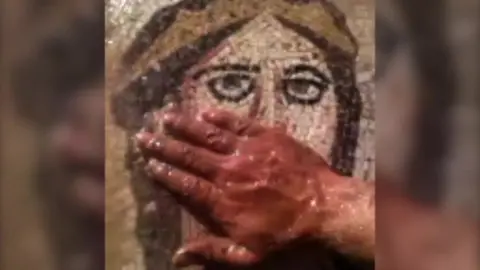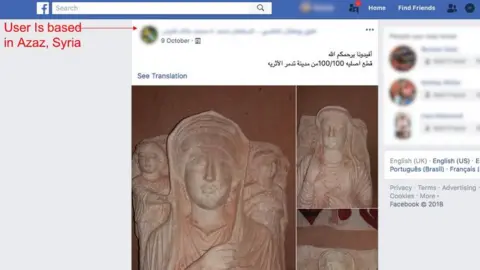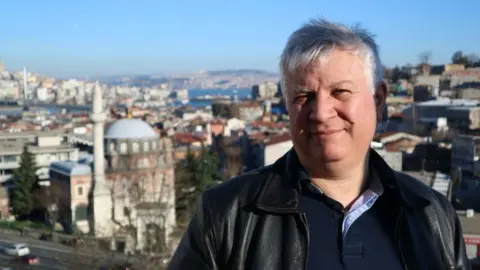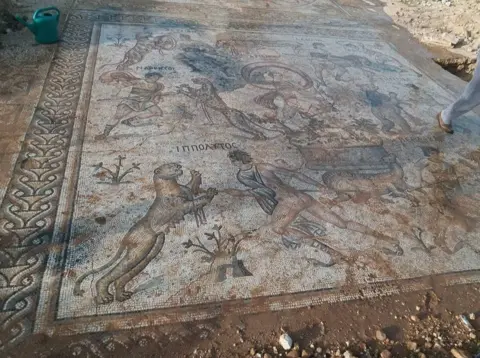Antiquities looted in Syria and Iraq are sold on Facebook
Facebook is being used by networks of traffickers to buy and sell looted antiquities.
Private groups also discuss how to illegally excavate ancient tombs, according to research by academics.
Facebook says it has removed 49 groups following the BBC's investigation.
The BBC has also seen evidence that antiquities are still being smuggled from Iraq and Syria into Turkey, despite a police clampdown and the retreat of the Islamic State group.
'Facebook's watch'
Roman mosaics still in the ground in Syria are being offered for sale on Facebook pages shown to the BBC by Prof Amr al-Azm, an archaeologist who has had to leave Syria and now works at Shawnee State University in Ohio.
On the rooftop terrace of a restaurant overlooking the Bosphorus in the Turkish city of Istanbul, he points to a Facebook photograph of a sculpture which a user in northern Syria claims is from the ancient site of Palmyra, looted and damaged by Islamic State.
 Unknown
UnknownProf al-Azm has spent two years trawling through hundreds of Facebook groups, many of which are private and often have thousands of members. His painstaking research was published in a 2018 co-authored article by World Politics Review.
"What we've seen is an explosion of sites and users on Facebook. It's transnational and Facebook is essentially allowing this to happen on its watch."
People use the groups to exchange ideas on how to dig up sites. One writes about an excavation that is under way and warns of the dangers of tomb collapse and suffocation.
There are also "loot-to-order" requests. In one case Facebook administrators ask for Islamic-era manuscripts to be made available in Turkey.
 Facebook
Facebook"It's really opened our eyes to how accelerated these trafficking networks are," says fellow researcher Katie Paul.
"Now if you dig something up in your back yard and you don't know a trafficker, you can hop on Facebook, share pictures of what you've found and connect with people who are willing to buy it."
The actual transactions take place offline, out of public view.
About 70% of artefacts leaving Syria are fake, according to the country's director of antiquities, but amidst the dross there are some very expensive items.

In a statement, Facebook said co-ordinating illegal activity was not allowed on the site "and following the BBC's investigation we have removed 49 groups".
But Amr al-Azm says many of the groups he is observing are still on Facebook.
Smuggling antiquities
The trade is not just happening on the internet.
Turkey has been used as a smuggling route for centuries. Millions of pounds worth of looted antiquities have crossed over from Iraq and Syria in recent years, Turkish police told the BBC.
Tighter restrictions on the borders have stemmed the flow but despite that and military defeats by the Islamic State group, objects are still being offered for sale.
The BBC has been monitoring this trade with the help of Abu Musa, a Syrian archaeologist who escaped from IS-controlled territory four years ago.
Abu Musa, not his real name, attends meetings held by intermediaries for sellers of stolen art.
"I know this work is very dangerous and difficult," he says.
"I work with people who are like a network of mafia."
He shows us photographs and videos sent by several sellers across the region. They include another mosaic still in the ground which he believes is genuine and worth thousands of pounds.
"I see my history and my culture destroyed in front of my eyes," he says.
 Facebook
FacebookThe struggle to save the rich cultural heritage of the Middle East is daunting.
"What's happening in Syria is dreadful," says Dr St John Simpson, curator of the Middle East Department at the British Museum.
"It's heartbreaking. Every site that is damaged is damaged forever."
All sides in the conflict in Syria have been responsible for ransacking ancient sites, says Dr Simpson.
They include impoverished citizens, looking to make a bit of money, and extremist groups cashing in.
The United Nations Educational, Scientific and Cultural organisation, Unesco, has described looting by IS on "an industrial scale".
But they don't just destroy. They also use the trade as a funding stream, although estimates of how much it's worth vary wildly between millions and billions of dollars.
Western art market
It is impossible to say where the stolen artefacts end up since many of them disappear from public view.
Police raids in Barcelona last year led to the seizure of mosaics and sarcophagi from Egypt and ancient Greco-Roman sites in Libya.
Two art dealers are accused of being involved in a smuggling ring that trafficked antiquities to finance a group affiliated to IS. The pair deny the allegations.
It is the first police operation of its kind targeting the financing of terrorism from looted art, according to Spain's interior ministry
Others are likely to follow since this illicit trade is fuelled by conflict and lack of order.